Peter MALONE
Saturday, 18 September 2021 19:24
Rhinstone
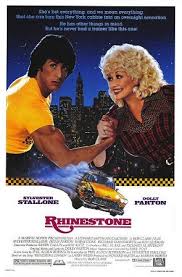
RHINESTONE
US, 1983, 106 minutes, Colour.
Sylvester Stallone, Dolly Parton, Ron Leibman, Richard Farnsworth, Tim Thomerson.
Directed by Bob Clark.
Rhinestone is a pleasing bit of nonsense - perhaps a bit too American in taste for non-Americans. The Monthly Film Bulletin reviewer remarked that it was too amiable a film to be labelled as bad. However, it is not a particularly good film. Allegedly based on the song 'Rhinestone Cowboy', it has the old story (as far back as Pygmalion) of somebody trying to shape another into something better. This time it is country & western singer in New York, Dolly Parton, training Sylvester Stallone, a New York taxi-driver, to be a country & western singer. While it works according to the plot, it doesn't exactly work in fact.
The film is enjoyable when Dolly Parton is on-screen with her easygoing style and her singing. Stallone almost does a send-up of his mumbling tough. Ron Liebmann is there to screech and scream (as he did in Zorro Swings Again). On the other hand Richard Farnsworth is amiable as Dolly's father and Tim Thomerson is very good as the backwoods singer. It is all colourful, far-fetched, with some lazy American backwoods humour - directed by Bob Clarke whose credits range from. Black Christmas to Tribute to Murder by Death and the Porky's films.
1. A popular piece of American entertainment? A star vehicle for Dolly Parton and Sylvester Stallone? How well do they work together? Do thew communicate their enjoyment to the audience?
2. Panavision photography, the world of New York nightclubs, city streets contrasting with the backwoods and the country & western town, bars, atmosphere? The importance of the musical score - Dolly Parton's work? Songs, lyrics, humour? Country & western style - as performed by Dolly Parton? As performed by Stallone? The send-up of country & western via rock music?
3. The title and the reference to the Rhinestone Cowboy? The glamour of the city and the clubs? The humour about American cowboys? Urban cowboys? Indication of themes?
4. The focus on Jake: Dolly Parton's personality and presence, cheerfulness, her contract and her wanting to get out of it, her singing in the club, the approaches of Freddie, her trying to ward him off, the decision about the bet, the choice of Nick, the set-up of the bet, her visit to his Italian household and their reaction? Her taking him south, the introduction to her father, his encounter with Barnett and the rivalry, the drinking? The city man at loose in the country - with jokes at the city slicker's expense? Jake training Nick? The rehearsals, the final performance, success? Back to New York, her almost losing the bet? Her falling in love with Nick, the clash between the two, Freddie's intervention? Nick riding out on the horse and rescuing her from Freddie? Jake joining him, for the final song? An American heroine?
5. Sylvester Stallone's style as Nick - real, spoof? His reckless taxi-driving with the Japanese passengers? The encounter with Jake, with Freddie? The bet? Going home to his family - and the humour about his playing the organ, the funeral parlour? The Italian ethos? His going south, his not being used to the country, friendship with Jake's father, the friendship with Barnett and then the clash, the farmyard scenes, his training, learning the backwoods humour, country & western jokes and trying them out, his singing, back to New York, the hooting and the catcalls, his rescuing Jake from, Freddie? A happy ending or not?
6. Freddie and the frenetic style of Ron Liebmann for the go-getting womaniser, his treatment of the women in the club, the auditions, his lecherous attitude towards Jake, his affluent bad style? The bet? His wanting to win the bet and his hold over Jake? The send-up of the conman with money?
7. Jake's father and the pleasant presentation of country & western? His country wisdom? The contrast with Barnett and his singing with Jake, in the bar, friendship, fight?
8. The New York clubs, the auditions, the various acts, the restless and hooting audience? The contrast with the pleasant sing-songs in the South?
9. Themes of show business, Pygmalion? Men and women and their roles in American society? Humour on the American scene?
Published in Movie Reviews
Published in
Movie Reviews
Tagged under
Saturday, 18 September 2021 19:24
Rhapsody in Blue
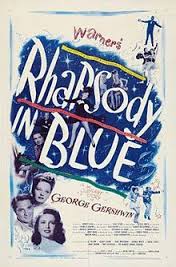
RHAPSODY IN BLUE
US, 1945,139 minutes, Black and white.
Robert Alda, Joan Leslie, Alexis Smith, Charles Coburn, Julie Bishop, Albert Basserman, Oscar Levant, Rosemary de Camp, Morris Carnovsky, Al Jolson, Paul Whiteman, George White.
Directed by Irving Rapper.
Rhapsody in Blue is a pleasing biography tribute to George Gershwin. Robert Alda in his film debut plays the composer quite genially. There is a good supporting performance by Herbert Rudley as Ira Gershwin. The piano work is contributed by Oscar Levant who plays himself, and Ray Turner. Many of Gershwin's popular songs are featured: Swanee, ‘Swonderful, Somebody Loves Me, The Man 1 Love, Embraceable You, Lady Be Good, I Got Rhythm, Love Walked In, I'll Build A Stairway To Paradise, Someone To Watch Over Me, Bidin' My Time as well as songs from Porgy and Bess, music from An American In Paris and the title composition, Rhapsody In Blue.
Direction is by Irving Rapper who made many films at Warner Bros. during the '40s including several Bette Davis vehicles. Alexis Smith was in a number of biographies at the time e.g. The Adventures of Mark Twain and the Cole Porter biography, Night And Day. Joan Leslie has the central role and has the opportunity to sing and dance. Al Jolson, Paul Whiteman, George White appear as themselves. There is the usual sentimental background of such
biographies of the time. However, the film gives some insight into Gershwin's New York background, his driving ambition and the success of his career as well as his innovations in popular and serious American music. His music has featured in many musicals and was used to striking effect by Woody Allen in Manhattan.
1. The reputation of George Gershwin in his time, later? His place in musical comedy, the composition of popular songs? His contribution to serious American music in bringing American themes, the blues, the negro music into concertos and rhapsodies? His brother Ira and his role in writing the lyrics and the composition of songs with the Gershwin signature? The musicals made with Gershwin music, the use of his music?
2. The tradition of Hollywood biopics: facts, fiction, sentiment, romance? The sketch of the life story, family, background? Struggles? Emotional clashes? Drive, motivation? Success and failure? How well were these incorporated into the screenplay? To give a picture of Gershwin, a tribute to him, an understanding of him as a person and composer?
3. The black and white photography, the world of the theatre, concerts? The presentation of the music, the songs, stage presentation, incorporation into the plot? The concerts? The music incorporated as part of the score?
4. Robert Alda's interpretation, his playing the piano? The stars and their contribution? Al Jolson, Paul Whiteman, George White appearing as themselves and their contribution to Gershwin's career? Oscar Levant and his playing, sardonic comments, friendship? The portrayal of the grief at Gershwin's death with Levant recording the Rhapsody In Blue?
5. Gershwin and his music - American traditions, his work as an accompanist, the musical comedy of the time, sheet music and records, his desire for writing serious music, the need for study, the blues and their incorporation into classical American music?
6. The New York background, the Gershwin boys and their growing up, the musical training, the practical background of the family, Papa Gershwin and his changing jobs? Mama Gershwin and her influence? The moulding of the characters, the pride in the career of George, Papa Gershwin and his timing the contributions? Ira and the bond with George? Their mutual support? George and his compositions and the development of Ira as a lyricist? The sentiment of the family sequences?
7. Gershwin's early work - on the streets, in the shop, accompanying singers and the sequence with Julie Adams and his sacking? His pushing his own music? His writing, his hopes?
8. Success and the influence of Max Dreyfuss? Dreyfuss and his ear for popular successes, Jolson and his liking of Swanee? Julie and her singing of Gershwin's songs, the shows - and the reviews? George White and his Scandals and giving Gershwin opportunity. The popular songs and their success?
9. The Professor and Gershwin's loyalty to him, the need for lessons, the serious strain in his music, the desire for more study and European experience? The support of Paul Whiteman - the Monday Blues and the lead in to Rhapsody In Blue and the concerto? Popular acclaim and its significance? The sentiment with the Professor's listening and his death? The continued development of Gershwin's serious music - with Cuban Rhythm , Porgy and Bess?
10. The influence of the Professor, George's going to Europe? The encounter with Rachmaninoff, Ravel and the composers of the day? His being influence by his European background and training? The nightclub and the singing of his song in French? Christine and her interest, her help, the relationship? The contrast of the sophisticated international traveller with Julie and her background of the stage?
11. The melodramatics of his return - the party, Julie and her looking forward to George's return, his bringing Christine and the surprise, Christine and her being edged out? Her artwork? Julie and her singing and being hurt? Christine and her judgment about what was best for George's career, the sequence in his room and her leaving? Julie's reaction? Julie and her successful career, her inability to break through George's hurry?
12. The Cuban work, the concerto, the tours, the visit to California?
13. George's illness, the cumulative effect of his drive? His anxiety, the phone call to Julie and the invitation for her to come? His early death? The friendship with Oscar Levant, the using of Levant's playing the Rhapsody to highlight the poignancy of Gershwin's early death?
14. A life, its significance? Relationships? Career? An appropriate tribute to one of America's best composers?
Published in Movie Reviews
Published in
Movie Reviews
Tagged under
Saturday, 18 September 2021 19:24
Revolutionary, The

THE REVOLUTIONARY
US, 1970, 101 minutes, Colour.
Jon Voight, Jennifer Salt, Seymour Cassell, Collin Wilcox-Horne?, Robert Duvall.
Directed by Paul Williams.
More a film for people interested in cinema or for younger adult audiences. Jon Voight plays an idealistic college student of philosophy who becomes more and more involved in labour and direct action and whose knowledge of ideas and theories lead him to a harsher realisation of the real world of ordinary, uninterested and unchanging people. The film, which is pretentious at times about its own attempts at depth, leaves him and the audience with a choice of conscience about inhuman means to desired revolutionary ends. The film reflects the dissatisfied idealism of many school and tertiary students and its issues are worth discussing by such groups.
1. Is this film meant to be a reflection of the late '60s U.S. revolution amongst the young? or is it a film just about the need for, the styles of, revolution in the latter part of our century? Why?
2. Where is the film set? Is this important? What are the issues the revolutionaries are interested in, the causes they espouse? Do they bear any relation to U.S. situations? Is this important?
3. It is suggested that the change and revolution go on in the mind of the hero -how true is this? Does the film's style suggest this?
4. What kind of man is A as the film opens - what does he really believe in? Does he live it? The meetings he goes to (and his clothes?), studies? lover? How "bourgeois” is he? How radical?
5. Was his relationship with Anne important to him?
6. What does he learn by being asked to bribe the Assistant Commissioner - about the Party, about himself (his clothes) and his real beliefs and attitudes? How important is this episode in his becoming credibly revolutionary?
7. What kind of man was Despard? What did he stand for? Why did A serve him? What were the consequences? Was he happy? Did he really believe in what he was doing; especially the printing and the strike incitement? Was it important to him that he be expelled from the University?
8. Why did he go into the Army? Did he believe in it?
9. Did Anne's marriage affect him?
10. Should he have deserted? Was his reason good? Was it consistent with his belief?
11. What kind of girl was Helen - why did she love A? How far was she prepared to go in being revolutionary for his sake?
12. Why did A accept Helen's help, enjoy life with her?
13. Why did Despard fail A? Was Despard's caution wise? How far had A changed by this? Why?
14. Why did A let himself be swayed by Leonard? What did Leonard stand for?
15. What was the significance of A's final predicament? What were his options? Should he have reached this stage of thinking and acting? Was he a genuine revolutionary? Why?
16. Was the film right to end as it did ? Why? What would A have done? why?
Published in Movie Reviews
Published in
Movie Reviews
Tagged under
Saturday, 18 September 2021 19:24
Revolt of Mamie Stover, The
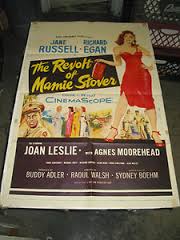
THE REVOLT OF MAMIE STOVER
US, 1956, 93 minutes, Colour.
Jane Russell, Agnes Moorhead, Richard Egan, Joan Leslie.
Directed by Raoul Walsh.
The Revolt of Mamie Stover is an entertaining but slight Jane Russell vehicle of the '50s. It is reminiscent of From Here to Eternity. However, the film indicates the censorship questions of the '50s - the plot is quite bowdlerised. Mamie Stover becomes an innocent dance hostess rather than a prostitute. The film highlights the problems of treating some subjects realistically at that period.
The film has lavish 20th. century Fox production values, Hawaiian settings, Cinemascope. The film was directed by Raoul Walsh - a veteran of action films from the silent period to many Warner Bros. actioners of the '30s and '40s.
1. An entertaining '50s story? The memories of World War Two? American style - dreams. money success? Money and morality? Romance?
2. Production values: Cinemascope photography, San Francisco, Hawaiian locations? The impact of the Pearl Harbor attack (more successful than in most films)? The sleazy atmosphere of Mamie Stover's world? Musical score? Jane Russell's songs?
3. The title and the focus on Mamie Stover, good-time girl, kicked out of San Francisco, on the move. her background in the South? Her work ad a dance-hall hostess - and the indications of euphemisms for prostitute? Her life at the bar? Dance-hall hostess? Her dream for money, relationship with Jim and its ups and downs, with Bertha. her success and failure? Her stances against those who impose themselves on her?
4. The portrait of Mamie Stover - good-time girl, on the boat, her hopes, going to her friend, working for Bertha and Harry, the routines of the bar, the friendship with Jimmy? The war and her buying up property, her decision to stay with Bertha and the money coming in, letters to Jimmy. the break-up of their relationship? The help from the military and her becoming high society? Her decision to return to San Francisco - and giving her money away? Her songs, glamour?
5. Jimmy as a writer, on the boat, his girlfriend. house on the hill, not wanting to meet Mamie, going to her, fascinated, offering her alternatives, his joining the army, Pearl Harbor, being wounded, the return and his disillusionment, letting her go?
6. Harry as the tough, his brutality with the girls, the attack on Mamie. the military fighting him, his being dismissed by Bertha?
7. A blonde Agnes Moorehead as tough Bertha, her memories, suspicions, running the bar, the rules, the deals with Mamie, profit?
8. The aristocratic world represented by Jim's girlfriend. country clubs, golf clubs? The contrast with the girls at the bar? Their regimented life?
9. The outbreak of the war, the impact of Pearl Harbor, money speculations and deals, soldiers away from home with the girls?
10. A credible resolution of the film? Mamie's return? Giving the money away? The moral stances of the '50s?
Published in Movie Reviews
Published in
Movie Reviews
Tagged under
Saturday, 18 September 2021 19:24
Revenge of the Ninja
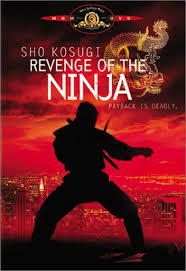
REVENGE OF THE NINJA
US, 1983, 80 minutes, Colour.
Sho Kosugi, Keith Vitali.
Directed by Sam Firstenberg.
Revenge of the Ninja was produced by the Canon Group, Yoram Globus and Menahem Golan. It is a sequel to Enter the Ninja, with Franco Nero, directed by Golan himself.
This film is a definite improvement on the original. It is stylishly photographed, the Ninja and martial arts fights imaginatively if fantastically choreographed and there is some characterisation and theme treatment. The contrasts between American and Japanese society are highlighted - modern western big business ways and traditional Japanese ways. The question of adaptation of the Japanese to the American way of life is also to the point. However, the emphasis is on the action and the heroism of the lead.
The film is set in Salt Lake City and the locations are very well used. There is a rousing score. Above average entertainment of its kind -though it does have strong stylised violence.
1. The popularity of martial arts films? Martial arts and American crime? International crime? The portrayal of violence in the '70s and the '80s? Japanese codes? American codes? Comparisons and contrasts?
2. The opening in Japan with its atmosphere: landscapes, costumes, decor? The transition to the United States? Salt Lake City? Authentic atmosphere? Colour photography? Editing and pace? The special effects e.g. the Japanese dolls? The rousing score?
3. The popularity of the martial arts in the West? Japan and the United States? The two cultures, the traditions? Comparisons, contrasts?
4. The background of the Ninja: good and bad, the opening massacre, audience expectations, the effect of the massacre on the Japanese family, the move to the United States, the exercise of Ninja martial arts in Salt Lake City? The irony of the American living in Japan and absorbing the Ninja tradition, using and exploiting it and Japanese heroes? The violence of the Ninja tradition, weaponry, codes? The choreography of the fights?
5. The plot and its familiarity from police stories on television? The massacre in Japan, the opening of the gallery in Salt Lake City, Japanese lifestyle in the United States, peace? The girl as a spy? The villain and his henchmen? The cover of the gallery fro drug-smuggling? The power of the Mafia and the clashes? The role of the police? The kidnap of the little boy? The fights? Conventions enjoyable for audiences?
6. Cho as hero? In himself, Japan, the death of his wife? His devotion to his mother - and his grief at her violent death? His love for his boy? Teaching him the martial arts? Kathy as his assistant? His work, retiring from Ninja arts? The dolls? The stealing of the dolls and the vigorous chase, the fights, dragged along the ground, into the van etc.? His being used by the villain? His scaling the wall of the building, the confrontation with the Mafia, the fight to the death with the villain? A typical hero? Humanity, skills?
7. The contrast with the villain, seeming friendliness, using Cho, the massacre of his family, the death of his mother? The boy witnessing this? Cruelty? The Ninja disguise and the mask? His murdering of the Mafia? His brutality towards Kathy? His henchmen - fat and brutal, torturing? The final fight and his death?
8. Kathy as the conventional heroine, spy, hypnotised by the villain, kidnapping the boy, redeeming herself?
9. The background of the Mafia - presented, caricatured? The hoods? The murders - the nephew and his girlfriend? The victims, the slaughter in the building? The Mafia chief dying?
10. The sketch of the police, their investigations, the martial arts policeman - and the pathos of his death?
11. The skill in the choreography of the martial arts fight? The emotional response of the audience? Admiration of skills? Response to the range of weaponry and its deadly effects - the man injured in the city centre through the eye, falling into the pool etc.?
12. The reasons for the popularity of this kind of film in the '70s and the 180s?
Published in Movie Reviews
Published in
Movie Reviews
Tagged under
Saturday, 18 September 2021 19:24
Revenge of the Nerds, The
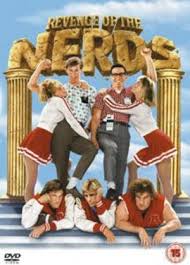
THE REVENGE OF THE NERDS
US, 1984, 86 minutes, Colour.
Robert Carradine, Anthony Edwards, Timothy Busfield, Curtis Armstrong.
Directed by Jeff Kanew.
The Revenge of the Nerds is one of the many youth-oriented comedies of the early '80s. It derives, in many ways, from National Lampoon's Animal House. with the emphasis on sex it is reminiscent of such films as Bachelor Party. It is typical corny campus comedy. However, it probably is less vulgar in tone than most, has some humorous sequences and effective leading performances by Robert Carradine and Tony Edwards. It was directed by Jeff Kanew who made the rather grim family film, Natural Enemies. A typical example of early '80s
American comedies.
Published in Movie Reviews
Published in
Movie Reviews
Tagged under
Saturday, 18 September 2021 19:24
Reuben, Reuben
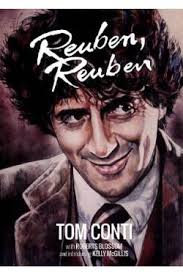
REUBEN, REUBEN
US, 1983, 95 minutes, Colour.
Tom Conti, Kelly Mc Gillis, Roberts Blossom, Lois Smith.
Directed by Robert Ellis Miller.
Reuben, Reuben was written for the screen by veteran Julius J. Epstein (amongst many credits, Casablanca). It is based on a novel by Peter De Vries and the play Spoffard by Herman Shumlin. It is a star vehicle for British actor Tom Conti (Glittering Prizes, Merry Christmas Mr. Lawrence) - and he does an excellent imitation of a Dylan Thomas-type poet let loose amongst the women of New England. He was nominated for an Oscar for his performance.
The film introduces Kelly McGillis? who was to make an impact in Peter Weir's Witness. Direction is by Robert Ellis Miller (The Heart is a Lonely Hunter, Buttercup Chain).
The success of the film rests on the tour de force performance of Conti - a satirical and entertaining portrayal of an eccentric poet.
1. The film as black comedy: wit, insight, wry pathos?
2. The title and the reference to Spoffard's sheepdog? The irony of the title? Friendliness, a fatal friendliness?
3. The world of New England, society? New York? The portrait of America? The America of the '70s and '80s?
4. The New England town, its lifestyle, poetry readings, women's associations, restaurants, motels, homes, church, farms? The contrast with New York City? The world of universities, business, book-publishing, the media?
5. Tom Conti and the strength of his performance, Oscar nomination? A performance of quality, entertainment, insight?
6. The poet Gowan McGland? - and the similarities to the image of Dylan Thomas? The British poet with the Celtic tradition? His origins, stories? The Celtic heritage? His poetry and its quality - words, images, insight, passion? An eccentric genius? His appreciation of beauty and his nonchalant womanising? His unashamed attitudes towards money and drinking? His frustration and blocking of his creative flow? The actual poems? The readings and the women's reaction? The courses and comment? Biography and meaning? His appearance: hair, lively eyes, clothes, dingy attitudes and appearance? A womaniser? Appreciation of things sensual? His permissiveness, age, the pun on lecher tour? His future - wandering, the danger of not being able to settle, any kind of commitment? His vision of Geneva, his gratitude towards her, delight, being her swain, the party, outings in the countryside? The affair, jealousy, humiliation? The range of affairs in the town? Bobby Springer and her possessiveness? Lucille and her hold on him? His playing one off against the other? The visit to his own wife, the writing of the biography? The recorder? The irony of Lucille's husband as dentist, his revenge, McGland's pain, the extraction of the teeth, the visit to the doctor's? His decision? Geneva's pregnancy? His decision to commit suicide - his discourse, arguing with himself? The spontaneous rushing in of Reuben and the pathos of his death? Themes of meaning of life death? McGland's death wish? A character in himself, his poses? Truth in drunkenness? His attitudes towards others - scorn, using them, not valuing them? The importance of his relationship Spoffard - friendship, understanding? A pathetic life?
7. Geneva and her attractiveness, the train ride and its humour, the paying for the ticket, the encounter. Todd, charmed, sharing the affair with him. the delight, the outings? The lyrical sequences? The contrast with the humiliations? His pain and his teeth, her pregnancy? Looking back or not and its effect on Gowan's decision to commit suicide?
8. The sketch of his wife - nice. happy, wry attitude towards him? Her memories? Using and exploiting? De facto relationship? The handsome actor? Yet talking to her by tape. his life for the record?
9. The women of New England - middle age, openness to affairs, feting him as the celebrity? Their reactions, awe, romance? The sexual liaisons? Bobby and the affair, dinner? Lucille. her age. throwing herself at McGland? Their bored lives? Husbands. business. no imagination? The dentist's son? The atmosphere of the university? Clashes. parties? Lucille and the phone. the anger, the affair and her husband's revenge? The dentist's? Destroying McGland?
10. The contrast with Spoffard - the old grandfather. pleasant, his being authentic, the truth, the friendship with Reuben? His wife? Geneva's parents and their plainness, their shock?
11. The focus on Reuben - sheepdog. relationship to Spoffard, Geneva, McGland? Reuben as a character - and crucial for the resolution?
12. Black humour - verbal, visual. farce., satiric? A bleak picture of human nature?
Published in Movie Reviews
Published in
Movie Reviews
Tagged under
Saturday, 18 September 2021 19:24
Return to Oz
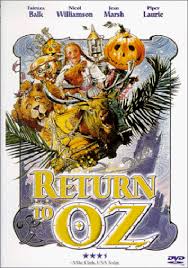
RETURN TO OZ
US, 1985, 105 minutes, Colour.
Fairuza Balk, Nicol Williamson, Jean Marsh, Piper Laurie, Matt Clark.
Directed by Walter Murch.
Return to Oz is a sequel to The Wizard of Oz and comes 45 years after the classic film with Judy Garland. This is a Walt Disney production. It boasts excellent special effects, Claymation work for the Nome King, special effects for flight and a range of characters who are designed to resemble the illustrations to Frank L. Baum's original books (rather than to the characters from the 1939 film).
The film is set in 1899, six months after the original adventures. Once again Dorothy is at home in Kansas, once more she is transported to Oz and takes the Yellow Brick Road. However, this time she has to save Oz from the greedy Nome King. With the help of characters resembling the Lion, the Tin Man and the Scarecrow, she confronts the Nome King. Later she returns home to Kansas to discover that the sinister doctor and his nurse have died (at the time they were destroyed as the Nome King, and Princess Mombi in the Land of Oz.)
The film is very well made but does not have quite the spark and zest of the Judy Garland version.
1. The popularity of the Oz stories? Books, illustrations? The 1939 classic? The decision to make a sequel in the 180s? For a worldwide audience? For children?
2. Production values: British studio and special effect work? The cast? The special effects, Kansas, Oz and its bleakness, the Nome King, ugliness and beauty, action sequences, flight, changes? The musical score?
3. Audiences responding to Dorothy? her experience in Oz? Six months later and her dreams? Aunt Em and her uncle's concern? The decision to take her to the doctor? The memories of the visit to Oz? Her fears? Her being frightened of Dr. Wilson and his nurse? The appearance of Ozma, the storm, the river? A prologue for the adventures in Oz?
4. The transformation to the world of Oz? the water, the desert, the rocks, the arrival at Oz, the ugliness of Oz and its dilapidation, finding the yellow Brick Road, the old house, the Lunch Pail Tree, the Wheelers and their living in the ruins, pursuing Dorothy, an atmosphere of mystery?
5. Tick lock as the Tin Man, comedy and the music, winding him up, the army, its help? Jack Pumpkin and his being fixed up? Gump and his head, sofa, components - a new Cowardly Lion?
6. Mombi as the witch, her gallery of heads? her vengeance against Ozma? With Dorothy? Sleep, powder, the Wheelers and going to the Nome King? Her imprisoning Dorothy? Her defeat? The irony of Nurse Wilson being Mombi?
7. The Nome King and his being made of rocks, the special effects for his presence and transformation, his voice and his shape becoming more human? His appearing, the challenge to Dorothy, the crash, the imprisonment? The quest and the guesses for Dorothy? Her three friends failing? The egg laid by Billina and the Nome King's death?
8. The world of the rocks and their menace?
9. Dorothy and her ability to cope, her wit, flying, avoiding her head being taken for Mombi's collection, her wit during the guessing and recovering her Mends?
10. The restoration of Oz, Ozma and her kingdom, her appearing in the mirror and promising to visit Dorothy?
11. The world of reality and fantasy? Dorothy and her dreams? Eggs and fowls and talking? The return home and the touch of fantasy?
12. The characters of Aunt Em, Uncle Henry? Dr. Worley and his sinister treatment? Nurse Wilson?
13. A blend of delight and fantasy, fright and terror? Ana the finale with: 'There's No Place Like Home'.
Published in Movie Reviews
Published in
Movie Reviews
Tagged under
Saturday, 18 September 2021 19:24
Great Mac Arthy, The

THE GREAT MacARTHY
Australia, 1975, 100 minutes, Colour.
John Jarratt, Judy Morris, Kate Fitzpatrick, Sandra Mc Gregor, Barry Humphries.
Directed by David Baker.
The Great Mac Arthy: What will non-Victorians make of this football-worship comedy? In fact, what will Victorians make of it? It begins like an Aussie Monty Python sketch, veers into the lavatory and corny overacting, shows us the humorous and ugly side of the Victorian Football League, its patrons, its TV commentators and TV commercials and, by the end, somehow or other is in a local version of Fellini psychological liberation combined with the enigmatic ending of 'Blow Up'. It is a bit hard to sit through with such mixture of styles and acting. Judy Morris and Barry Humphries are excellent and John Jarratt, is a kind of innocent abroad in a rather unlikeable Melbourne.
1. How enjoyable and interesting a film? How successful? The film was not a critical or box-office success. Why? Themes? Too local? Styles? The focus on the title on Macarthy himself and his greatness? The original novel was A Salute to the Great Macarthy. What kind of salute was this? The film looked conscious of its style; comment on the use of colour, musical themes, atmosphere of realism, Australianism, documentary styles, especially for the football sequences, the transition to fantasy? The editing to blend the various styles?
2. The impact on Victorians? Humorous, reflection of the way of life, critique? The film for non-Victorians and their understanding? Was the film too localised? Or did it transcend its local limitations?
3. The focus on the themes of Australian Rules; as a sport, as a business, the men involved, sportsmen, businessmen? The long tradition of Australian Rules in Victoria? Could the audience universalise these sports and business themes for all sports or countries?
4. How important were the themes of society, greed? The aims of the film presenting a story, character, critique? Macarthy as a symbol of this kind of world? The tone of the pre-credit sequence with its liveliness, style, humour? The establishing of Kyneton and the bush? The importance of football and football playing? The types who play it? Status? The suddenness of the kidnap? The balloon as an apparition? The celestial overtones with the flashing lights? The personalities of the kidnappers and their style? The promise in this pre-credits sequence and its fulfilment?
5. How attractive a young man was Macarthy himself? His strengths of character, weaknesses? As a young man from the country being introduced to the city? Being kidnapped? His attitude to the VFL? His involvement in football, love of the game, training? Teamwork? His interaction with the other members in the team? His study? The personalities of the coaches, the business men and the contrast with him? How did he stand out as the innocent in the city?
6. How did Macarthy change during his stay in the city? What were the main factors in the change? City life and sophistication, complications? Football? His being manipulated? Study and the involvement with Miss Russell? What type of woman was she? Study, sexuality? The humour and satire in the sex scenes?
7. The contrast with Vera as a type, her response to Macarthy, eg. the drive-in sequence? The contrast with Andrea and her society background? Attitudes to sexuality?
8. Comment on the film's portrayal of business men and types? Colonel Boyle-Miller? and his home, attitudes, position and status? Attitude towards Macarthy? Comment on the 'sex-romp' sequences and their appropriateness to the film? Comic aspects?
9. The presentation of sport, goals of sport, mystique, participation, audience hysteria? The competitiveness of sport, the skill? The uglier side of sport? How well did the film portray the matches, the cinematic technique used to communicate the game? Television influence? How comprehensible were the matches for the audience?
10. The build-up to the ending? Macarthy in a fantasy world? Withdrawing from reality? The comic-book overtones, the existential parable of overtones? Macarthy alienated and wandering? An appropriate ending for this salute to him? His decline and disillusionment? The corruption of innocence?
11. The quality of the Australian jokes, the butt of Australian jokes, the attacks? How much valuable Australian self-understanding through comic modes?
Published in Movie Reviews
Published in
Movie Reviews
Tagged under
Saturday, 18 September 2021 19:24
Return of the Soldier, The
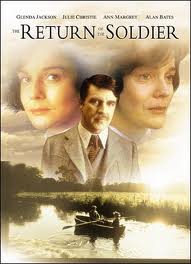
THE RETURN OF THE SOLDIER
UK, 1982, 98 minutes, Colour.
Alan Bates, Glenda Jackson, Ann Margret, Julie Christie, Jeremy Kemp, Ian Holm, Frank Finlay.
Directed by Alan Bridges.
The Return of the Soldier is based on a novel by Rebecca West. it was directed by Alan Bridges who has an interest in this early 20th. century period with films like The Hireling and The Shooting Party.
The film focuses on three women in the life of a British soldier (Alan Bates) who loses his memory in the experience of warfare in France. The women are very good: Julie Christie as the selfish socialite wife, Ann-Margret? as the plain and self-effacing cousin, Glenda Jackson as the working-class woman who holds a strong place in the memory of the soldier. There is an excellent supporting cast including Ian Holm and Frank Finlay. There is a fine recreation of the period - and it is interesting to watch the character study and see the film as a symbol of transition in British society.
1. A film of its period? The work of Rebecca West, her novels? Transition to the screen?
2. The re-creation of the period of the First World War. British society, elegance, wealth? The contrast with the working classes, the town, the homes? The interaction between the two classes? The experience of involvement in the war? The emerging of a new world? The style of the 20th. century?
3. The film as a British memoir, a memoir of society? Characters symbolising change? The theme of memory, amnesia? The attention to detail, costumes, social entertainment? The details of the housing estate homes? The musical score?
4. The focus on Chris, the title of the film? Alan Bates' presence as the soldier? His war service and experience? The amnesia and its results? His hospitalisation? Care and concern? The revelation of the quality of his marriage, the death of the child? His closing his memory of the marriage off? Jenny and her tenderness? The wanting to see Margaret? His living in a make-believe past? Delighting in the memories? The visualising of these? The visit of the psychologist, his sessions? Hope for therapy? His fellow soldiers and their discretion, attempts to help? Friends and family? His being lost in his make-believe world, the interactions with Margaret? Margaret's decision to tell the truth - the women looking out of the window and the soldier turning to face them? A symbol of Britain's past, the experience of the First World War and change?
5. Kitty and Julie Christie's style, presence? Society, spoilt, wrapped in herself? Her disdainful treatment of Jenny? Of animals, of servants? Her reaction to Chris' return? suspicious? Thinking he was feigning amnesia? Her inability to cope? Her being contemptuous of Margaret. despising her clothes and manner? The clashes with her, with Jenny? Her being hurt, sulking? The question of her love for Chris or not?
6. Jenny as devoted cousin? Ann-Margret? and her presence, playing against type, her plainness. tenderness? The importance of her visualised nightmares, dramatising the war? Her own involvement? Her memories of Chris? Her devotedness in the family. the contrast with Kitty? Her running the household? Kitty and her whims? Jenny as a victim? Her decision to go to see Margaret Grey? Persuading her to come? Supporting her? Supporting her against Kitty? Her anxiety about Chris, the decision to tell him the truth, watching through the window?
7. Margaret Grey and Glenda Jackson's style and presence, manner of speaking, bearing, clothes? Dowdy town housewife? Her home, the cooking? Her relationship with William? His pottering in the garden, working? Their neighbours? Jenny's visit, the car? Telling the story? Her husband giving his assent for her to go? Her going to see Chris, his living in the past, sharing the past romance, her compassion? Being spurned by Kitty? The question of Chris in his make-believe world? Her dilemma, the experience of the loss of a child? The telling of the truth?
8. William as a good man, his love for his wife, his understanding and his not understanding her relationship with Chris?
9. The psychologist and his visits, his talking with Chris, his attempts to probe Chris' psyche, stir the memory?
10. The war veterans, the hospital and the patients, suffering, the effects of war?
11. The glimpse of English society, soirees and gatherings, meals, their concerns, manners? The contrast with the servants? The people in the town? The background of upstairs downstairs?
12. The film working on a realistic level? Symbolic level? Characters, war and peace, society and class distinctions, an emerging world?
Published in Movie Reviews
Published in
Movie Reviews
Tagged under